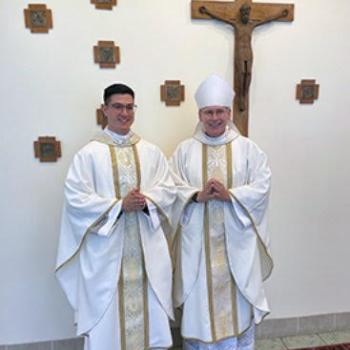Matthew 12:38-42 – Please explain this section of the scripture since Jesus rose on thye third morningafter his death..
I’m not sure. It could be that Jesus is exaggerating the parallelism between his passion and the story of Jonah in order to make the basic parallel clear. It could be that he is reckoning his sufferings on Thursday night as part of the descent into the heart of the earth. Perhaps both. Or maybe he’s making some other point that eludes me.
A word on such passages. They are (or should be) ocassions for what (if memory serves) Scott Hahn refers to as the “Holy ‘Huh?'”.
What I mean is this: in our present culture of radical skepticism toward anything biblical there can often be a corresponding reaction from believers in which we feel that we must instantly supply an EZ “explanation” for every puzzling passage in Holy Writ, lest some skeptic leap on it in order to offer yet another peroration on the “lies and contradictions of Scripture” etc. blah blah. So, for instance, the passage above is often a favorite for flat-footed fundamentalist atheists to argue that Jesus “contradicts himself” by only remaining dead for two nights instead of three. It is–rather like the complaint about the Woman in Revelation 12 having birth pangs–a weirdly tin-eared critique, since it boils down to saying, “Yeah, Jesus rose victorious over sin, hell and death, destroyed the kingdom of Satan, and lifted the human race to glorious eternal life in his Risen Body. But what’s *this* I spy? He did it in three days and *two* nights! Ah HA! Clearly, he contradicted himself! I win! The gospel is a sham!”
Christians who get snookered by this sort of Fundamentalist Atheist proof-texting will often defensively respond with simple declarative sentences in which what they lack in certitude about Christ’s cryptic remark is made up for in emphasis. Hahn’s point is that it’s okay to not quite know what a biblical passage means. It’s okay to be content with mystery and to ruminate and wonder. One need not be enslaved to the skeptic’s slavish enthrallment to the notion “If Scripture is mysterious, that’s only because it’s all a fraud.”
Skepticism bills itself as “the chastity of the intellect”. Skeptics always advertise themselves as hard-headed thinkers who are obviously a cut above credulous fools. But in fact a thorough-going skepticism is the sterility of the intellect. A refusal to believe a credible witness is not wise but stupid, and dogmatic skeptics are as stupid as they come when it comes to the testimony of the New Testament. The knee-jerk skeptical take on this passage can only mean one of two things: either it means Jesus was God enough to rise from the dead but still too dumb interpret the Scripture he himself had inspired or, it means Matthew is such a stupid writer that he records this saying, forgets completely that he’d jotted it down and then goes on to record three days and two nights in the tomb. Being either too stupid to notice or too lazy or cheap to fix the discrepancy, he then publishes his gospel. And the whole Church is too stupid to fix the “contradiction” too. Only the modern critic, being 2000 years smarter than all those stupid ancient people, noticed it. Boy, is the Church’s face red! Christianity is disproved!
Christians aren’t committed to any of this sort of fundamentalism. Instead, they can begin with the normal human trust that Matthew was a competent writer, that Jesus was a competent teacher, and that obvious “discrepancies” like this became part of the text precisely because the author had a point he wished to make. Our task then become “Try to understand what that point might be” rather than “Construe every passage as further evidence that the text is a fraud and the author is an absolutely incompetent moron who can’t even remember what he wrote.”
Just a couple of tips for reading Scripture while avoiding the Spirit of the Age.















